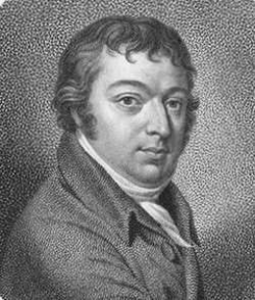The nightingale
(Poet's title: Die Nachtigall)
Set by Schubert:
D 724
for TTBB quartet and piano[spring 1821]
Bescheiden verborgen im buschichten Gang
Erhob Philomele den Zaubergesang,
Er schildert der Treue beglückenden Lohn
In hallenden Schlägen, im wirbelnden Ton.
Sanft gleitet die Stimme aus schwellender Brust,
Als Hauch der Gefühle, als Zeuge der Lust;
Ach horcht! wie der Seufzer der Sehnsucht verhallt,
Wenn lieblicher Einklang der Seelen erschallt.
So, Freunde, verhallte manch himmlisches Lied,
Wenn Cynthias Feuer die Finsterniß schied,
Es wehte mit Frieden uns wonnigen Schmerz
Aus Schwingen der Töne ins fühlende Herz.
Hiding modestly in the bushes by the path
Philomel struck up her magical song,
It describes the gratifying rewards of fidelity
With echoing chimes, in swirling notes.
The voice glides gently out of a swelling breast,
As the breathing of sensitive feelings, as a witness to pleasure;
Oh, listen to how the sighing of longing dies away
When the loving harmony of souls rings out!
Similarly, friends, many a heavenly song died away
When Cynthia’s fire cut through the darkness.
A blissful pain brought peace as it wafted
Into our feeling hearts on the wings of music.
All translations into English that appear on this website, unless otherwise stated, are by Malcolm Wren. You are free to use them on condition that you acknowledge Malcolm Wren as the translator and schubertsong.uk as the source. Unless otherwise stated, the comments and essays that appear after the texts and translations are by Malcolm Wren and are © Copyright.
☙
Themes and images in this text:
Breath and breathing Bushes and undergrowth Chest / breast Fire Harmony Hearts Longing and yearning Magic and enchantment Night and the moon Nightingales, Philomel Pain Sighs and sighing Soul Wings
Poets have always interpreted the significance of the nightingale’s song in different ways. The fact that it hides in the bushes partially explains why most of them have not questioned the assumption that the singer is a female (ornithologists have long known that the females tend to be mute). Many poets (those who have had a classical education) have been influenced by the story in Ovid’s Metamorphoses (Book 6), which presents the nightingale’s song as both a lament and an accusation. Having been raped by her brother-in-law, Philomel is turned into a nightingale and her song continues to remind us of her innocence. Unger changes this slightly and says that it is a song that extols the benefits of fidelity.
Cynthia also appears in Ovid, but in Unger’s poem she seems simply to be ‘the moon’ (another name for Diana or Selene). When Cynthia’s fires separated the darkness, all that happened was that moonlight appeared through the clouds.
☙
Original Spelling and notes on the text Die Nachtigall Bescheiden verborgen im buschichten Gang Erhob Philomele den Zaubergesang, Er schildert der Treue beglückenden Lohn In hallenden Schlägen, im wirbelnden Ton. Sanft gleitet die Stimme aus schwellender Brust Als Hauch der Gefühle, als Zeuge der Lust, Ach horcht, wie der Seufzer der Sehnsucht verhallt, Wenn lieblicher Einklang der Seelen erschallt. So, Freunde, verhallte manch himmlisches Lied, Wenn Cynthias Feuer die Finsternis schied, Es wehte mit Frieden uns wonnigen Schmerz Aus Schwingen der Töne ins fühlende Herz. The text above is as set by Schubert. The manuscript of Unger's unpublished poem has some differences in wording (indicated in bold below): Bescheiden verborgen im buschigen Gang Erhob Philomele den Zaubergesang, Er schildert der Treue entzückenden Lohn In hallenden Schlägen, im wirbelnden Ton. Bald gleitet die Stimme aus sanfterer Brust, Als Hauch der Gefühle, als Zeuge der Lust; Ach horch! wie der Seufzer der Sehnsucht verhallt, Wenn lieblicher Einklang der Seelen erschallt. So, Freundinn! ertönte dein himmlisches Lied, Als Cynthia traulich die Finsterniß schied, Es wehte mir Frieden mit wonnigen Schmerz Aus Schwingen der Laute ins fühlende Herz.
Confirmed by Peter Rastl with J. Carl Ungers Lieder. Nach geahmt oder Von ihm selbst gedichtet und in Musick gesetzt, pages 21-22.
Note: Unger’s poem was not published in print. The above source is a manuscript music book in Unger’s own hand, preserved in a British private collection.


